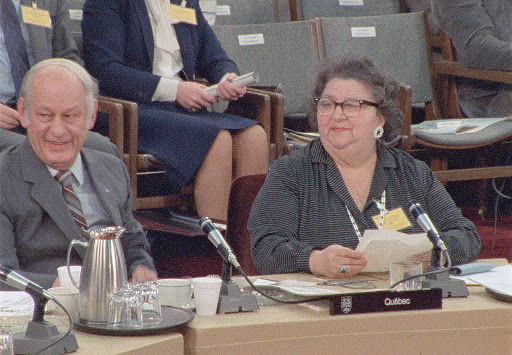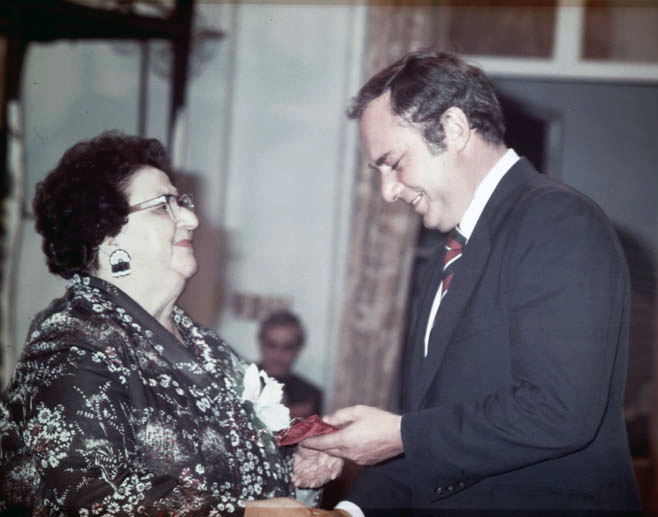Two-Axe Earley, Mary (1911-1996), was a Kanien’kehá:ka (Mohawk) woman who became a key figure in Canada’s women’s rights movement. For more than two decades, she challenged sex discrimination against First Nations women in the Indian Act. First Nations are original peoples of the land that is now Canada. The Indian Act is a Canadian law dating back to 1876. It uses the term Indian to refer to First Nations people. Today, many people view that term as outdated and offensive.
Mary Two-Axe was born on Oct. 4, 1911, on the Kahnawà:ke reserve near Montreal, Quebec. As a young woman, she relocated to Brooklyn, New York City, in search of employment. There, she married Edward Earley, an Irish American man. By doing so, she lost her legal status as an “Indian.” The Indian Act defines who is an “Indian” and who can belong to an “Indian band” (First Nation). Before 1985, Indian women who married non-Indian men were stripped of their Indian status under the law. They and their children lost the right to live or vote in their own communities and to access critical social benefits and programs. Thus, the law severed their ties with their culture. It aimed to assimilate (absorb or incorporate) them into the society created by European settlers.
During the 1960’s and 1970’s, Two-Axe Earley cofounded several women’s rights groups. These included Equal Rights for Indian Women, of which she was president; Indian Rights for Indian Women, of which she was vice president; and the Quebec Native Women’s Association. She worked persistently to raise awareness of how the Indian Act discriminated against First Nations women. She inspired a national network of allies that included Thérese Casgrain, a Canadian activist and political leader; Marguerite Ritchie, the founder of the Human Rights Institute of Canada; and the National Action Committee on the Status of Women (NAC), a feminist, activist organization. In 1968, Two-Axe Earley spoke before the Royal Commission on the Status of Women in Canada (RCSW). In a report issued in 1970, the RCSW recommended that the Indian Act be amended to remove discriminatory provisions.
In 1975, Two-Axe Earley attended the United Nations World Conference of the International Women’s Year in Mexico City, Mexico. At the time, she was living with her daughter on the Kahnawà:ke reserve, where she had moved following Edward Earley’s death. While at the conference, Mary received notice that she had been evicted from Kahnawà:ke, based on her not having Indian status. She then spoke publicly at the conference about her experience. This drew international attention to the issue of sex discrimination in the Indian Act for the first time, and Mary’s eviction was withdrawn.
Back in Canada, Two-Axe Earley continued to challenge the Indian Act. In 1983, supported by Quebec Premier René Lévesque, she spoke at the Federal-Provincial Conference of First Ministers on Aboriginal Constitutional Matters in Ottawa, Ontario. Two-Axe Earley’s work was instrumental in the passage of Bill C-31 by Canada’s Parliament in 1985. This bill amended the Indian Act. It allowed for thousands of women and their children to regain their Indian status. On July 5, 1985, Two-Axe Earley became the first woman reinstated as a status Indian under Bill C-31. Two-Axe Earley died on Aug. 21, 1996. Because of Bill C-31, she was allowed burial on the Kahnawà:ke reserve where she was born.

Two-Axe Earley received a number of honors for her work. In 1979, she was given the Governor General’s Award in Commemoration of the Persons Case for advancing women’s and girls’ rights in Canada (see Famous Five). In 1981, she received an honorary Doctor of Laws degree from York University. She was made an officer of the National Order of Quebec in 1985. And in 1996, she received a National Aboriginal Achievement Award (later renamed the Indspire Award). On June 28, 2021, a Google Doodle on the Google Canada homepage honored Two-Axe Earley. Doodles are temporary changes made to the Google logo to celebrate special days, events, and people. Two-Axe Earley continues to inspire a movement for full sex equality for First Nations women and their children.

